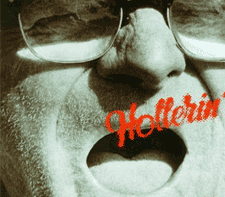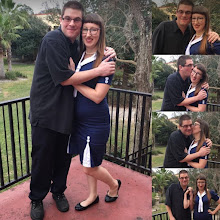
Rounder, 1983; available
24 tracks, 59:21
For years I've known of this album. I had MANY misconceptions about it. For one, I was under the impression it is just a live recording of the National Hollerin' Contest (it actually seems to be field recordings a la Alan Lomax). I also assumed it was going to be an awful recording only good for a laugh. In my defense, one of the tracks IS credited to "Dan McLamb & His Three-Legged Dog Percy". The truth is that this is an extraordinarily interesting and poignant document of an unknown American folk tradition. Hollerin' (that's the actual spelling) has its origins in the pre-mass communication days and was centered in Spivey's Corner, NC. Most people today feel they can't live without a cell phone; the farmers who created hollerin' didn't even have home phones or walkie-talkies. The style orginated as a way of communication and bonding, since hollerin' can be very loud and heard for miles. It can be divided into four basic subcategories: Distress hollers, used to announce death, accidents, emergencies, etc.; functional hollers, such as animal calls; communicative hollers, the hollerin' equivalent of "hiya, neighbor!"; and expressive hollers, which can be original or traditional songs in holler style and other purely fun hollers. Most of the tracks, especially those by Leonard Emanuel and O.B. and Dewey Jackson, share a lot in common with other unusual vocal styles such as throat singing and sacred harp. If you can picture throat singing done with high pitches rather than low pitches, you have a solid idea of what this is like. The functional hollers are as unique as each artist; no two truly sound alike. Along with animal calls, there is an example of a holler used to "mock a fox". The original expressive hollers obviously had care put into their creation, including Leonard Emanuel's touching-but-snarky "I Wish I Was Single Again". The traditional expressive hollers include "Shortnin' Bread", "What A Friend We Have In Jesus", and even versions of "Santa Claus Is Coming To Town" and "Happy Birthday To You"! Both Emanuel and H. H. Oliver present distress hollers; it's easy to see why these would draw attention. The communicative hollers have some of the most lilting passages, and the spirit of camaraderie literally pours out of the performers. For being recorded in 1975 and 1976, the sound quality is impeccable, lacking the defects which sometimes tarnish older field recordings. There are ten different performers, each with a hollerin' style all their own. Names like O.B. Jackson and Dewey Jackson (yes, they are related) are probably unknown even to serious folk scholars, but they shouldn't be. While many listeners seriously just won't be able to get into this, students of folk music and even outsider music fans need this album. It truly is one of the most amazing documents of American folk I have ever heard and it deserves to be more widely known.

No comments:
Post a Comment